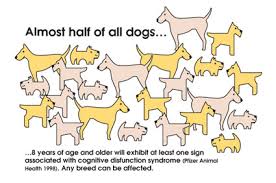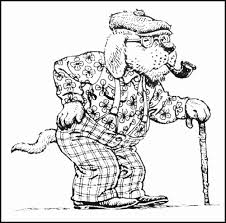
Four years ago I performed a wellness examination, vaccinations, and other preventative care with screen tests on a relative's pet dog, "Guppy," a 13-year old, intact male, grumpy Chihuahua. The question came up about how long he had left to live, and I responded he was well into his geriatric years, and lifespan could certainly be increased with proper and timely wellness, preventative and illness care. About one year later, he became very ill, with vestibular syndrome, more sedentary, with difficulty walking, and reduced trips to the bathroom and to his food dish. Slowly, he improved, and now lives a very old, grumpy, sedentary life in the environment he feels most comfortable in, living one day at a time. Some days are better than others, but he's still around to bless us with his pleasant personality.

In the past four years, "Guppy's" sensation and mental interpretation of his environment have slowly declined, and he is another geriatric pet suffering some level of
Cognitive Dysfunction. This slowly-developing degenerative brain disease is sometimes missed by pet owners. Sometimes the signs are subtle and easily missed before pets are evaluated by their veterinarians. Some common signs of
cognitive dysfunction include (but are not limited to): mood swings, decreased activity, decreased appetite, inability to recognize previously-familiar environments, surroundings or people, inappropriate elimination in the house, slow to respond, increased irritability, some level of blindness, and sometimes seizure-like activity.

When an aging pet begins to show abnormal signs and "not acting right," it is time to schedule an appointment with the veterinarian, whom may recognize the signs of
cognitive dysfunction and best recommend the course of intervention. The first things that may be recommended could include: physical examination, neurologic evaluation, blood and urine testing for metabolic and infectious diseases, fecal testing for parasites, X-ray studies to identify any tumors, etc. Some treatments that may help slow down mental degeneration include supplements for increased brain function and decreased inflammatory chemicals, increased play time, problem-solving toys, exercise, and some prescription diets and medications.

Remember, dogs age much faster than humans, correlating an average 7-year old dog to 47-human years, an average 11-year old dog to 65-human years, and an average 15-year old dog to 83-human years
(varying for weigh, breed, and average veterinary care). Most veterinarians may recommend bi-annual examinations for dogs 7-years and older and annual blood screening tests to best detect any abnormal aging and disease in your pets. Early detection leads to earlier veterinary intervention and correlates to better outcomes.
Any questions you may have about
Cognitive dysfunction may be directed to your veterinarian or to Dr. Sam Pet Hospital (
www.doctorsam.net).
No comments:
Post a Comment